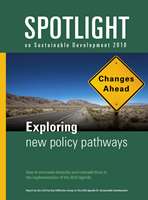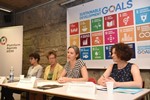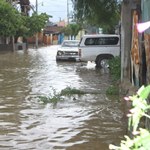Social Watch news
Published on Mon, 2019-03-25 14:34
A common theme that ran through the 50th Session of the UN Statistical Commission, March 2019, was the often tense interface between data and policy-making and the asymmetrical power dynamics that shape it. This was evident in the several reports submitted for consideration by the Commission. One from the UN Statistics Division (UNSD) reported on the federated system of data hubs, designed to integrate new data sources into a platform which is accessible to National Statistics Offices (NSOs) and creates comparable data among users. Another was a proposal by the High-Level Group for Partnership, Cooperation, and Capacity Building for the 2030 Agenda for Sustainable Development for a UN Chief Statistician to enhance the voice of statistics in UN policy processes.
|
Published on Fri, 2019-03-15 12:23
Under the motto "Imagining Gani", Social Watch Philippines gave tribute last March 11 to Isagani Serrano, who passed away last February 22nd. Gani was a Co-Convenor of Social Watch Philippines and a contributor to the national Social Watch reports for several years. He was president of the Philippine Rural Reconstruction Movement (PRRM) and author of numerous papers and reports on climate and social justice.
Roberto Bissio, from the international secretariat of Social Watch, contributed a personal testimony: "Guiding Gani through Montevideo at his first visit to my hometown was not an easy a task, as his curiosity was insatiable. He definitely had to visit the places where tango was born, and impressed me with his knowledge of the songs and biography of the legendary singer Carlos Gardel. And he insisted on visiting the old jail of Punta Carretas, then already transformed into a shopping center, out of which over a hundred political prisoners escaped in the early seventies through a tunnel. "That episode costed me six months of solitary confinement" remembered Gani to my surprise. In those times Gani was a prisoner himself in the Philippines "and when we heard the news of the tupamaros escaping, we started digging ourselves... but got caught!"
|
Published on Fri, 2019-03-15 12:17
The push for greater private sector involvement in the implementation of SDG 6, the Sustainable Development Goal on water, flies in the face of growing evidence that the privatization of water and sanitation has been detrimental, especially to the most marginalized and vulnerable communities in the world.
Evidence shows that private investors have largely ignored the most underserved regions of the world while favouring more lucrative markets requiring less capital and promising greater returns. For instance, in Chile, where 95 percent of the water and sanitation services are in private hands, the State invested significant public funds in order to achieve extensive coverage before it was sold to private investors with the promise of a 7 percent return. Corporate utilities operating in Chile have not expanded networks outside profitable urban centres.
|
Published on Fri, 2019-03-15 12:13
The report on Switzerland by the NGO coalition Alliance Sud emphasizes the negative spillovers of policies: “Swiss foreign economic policy and its international financial and fiscal policy are still far from taking sufficient account of the requirements of the 2030 Agenda.” After a visit to Switzerland, UN Independent Expert on foreign debt and other financial obligations Juan-Pablo Bohoslavsky drew attention in a report to the Human Rights Council to deficiencies in the prevention of unfair financial flows and problems in the area of international corporate taxation: “The existing Swiss tax privileges for the foreign profits of multinational corporations ... create massive incentives for profit transfers to Switzerland and help to deprive developing countries of potential tax revenues in the hundreds of billions.”
|
Published on Fri, 2019-03-15 12:10
Peru was affected by natural disasters more than a year ago, when heavy rains and floods affected 21 of its 25 departments. As of May 2018, thousands of families still lived in tents and many schools and hospitals had not recovered completely. In fact, many families still have not recovered their houses, destroyed by an earthquake in 2007, more than ten years ago!
Peru is part of the “Ring of Fire” around the Pacific Ocean, prone to earthquakes and volcanic activity. It is further vulnerable to the climate change-induced alterations in ocean currents, causing floods in the north of the country and drought in the south and centre. According to the report by Grupo Red de Economia Solidaria del Perú (GRESP) and the Intercontinental network for the promotion of social solidarity economy (Ripess) “lack of planning in the use of land for housing and criminal-led occupations of unsuitable terrain to set up slums make the problem worse.
|
Published on Mon, 2019-03-04 12:28
Statisticians from around the world, meeting at the UN Statistical Commission in March, will again take stock of progress in the world of data over the previous 12 months, largely driven by the 2030 Agenda for Sustainable Development. The official report on filling the gaps in the global indicator framework—a clear priority of the 2018 Commission—show that while some progress has been made much has stalled. Gaps and tensions continue over the selection and interpretation of indicators, the data to fill them, the selection of partners as well as control of the process and ownership of the results.
These struggles go back to the negotiations over the 2030 Agenda and its goals and targets, and have continued into the effort to define the global indicator framework. A special edition of the Global Policy Journal details the complex power dynamics involved throughout this process. Contributors show that the selection of indicators does not depend purely on technical considerations but ultimately concerns political questions of competing priorities among a range of different players. One proposal, outlined below, argues that national statistical systems urgently must take charge of this process, and shows how they can do it.
|
Published on Wed, 2019-02-27 12:14
Social protection has surfaced to the top of multiple agendas, from human rights to the promotion of economic growth, from decent work to economic, social and gender equality. Its champions, particularly at the global level, include a host of different players, with different priorities, institutions and policy streams, all competing to define the concept and own the discourse.
|
Published on Mon, 2019-02-25 11:57
Gani passed away last February 22nd. Gani was a Co-Convenor of Social Watch Philippines and a contributor to the national Social Watch reports for several years. As a president of the Philippine Rural Reconstruction Movement (PRRM), visit http://www.prrm.org/isagani-r-serrano.html.
|
Published on Thu, 2019-02-21 09:16
The 2030 Agenda for Sustainable Development has become a premier driver and justification for institutional and financial reforms along with the collection and analysis of more and more sophisticated data and statistics. Many UN Commissions are contributing to the implementation of the 2030 Agenda and achieving the Sustainable Development Goals (SDGs). One of these is the UN Statistical Commission, which meets for its 50th annual session 5 - 8 March 2019 at the UN headquarters in New York.
Big data, geospatial data, national statistical capacity, and common standards for the exchange of data are among some of the agenda items the Commission will address, along with progress on the SDG indicator framework.
|
Published on Mon, 2019-02-18 11:59
In Palestine, the main obstacle to realizing the SDGs is the occupation that continues to confiscate lands and, as reported by UNCTAD, deny Palestinians the human right to development. The indicators are alarming: unemployment has reached 27.7 percent in the Palestinian territories occupied in 1967 and 44 percent in the Gaza Strip. The poverty rate for the year has reached 29 percent in 2017 and it is 53 percent in the Gaza Strip, reflecting the catastrophic effect of the 10-year ongoing blockade.
|
SUSCRIBE TO OUR NEWSLETTER
Submit

|









